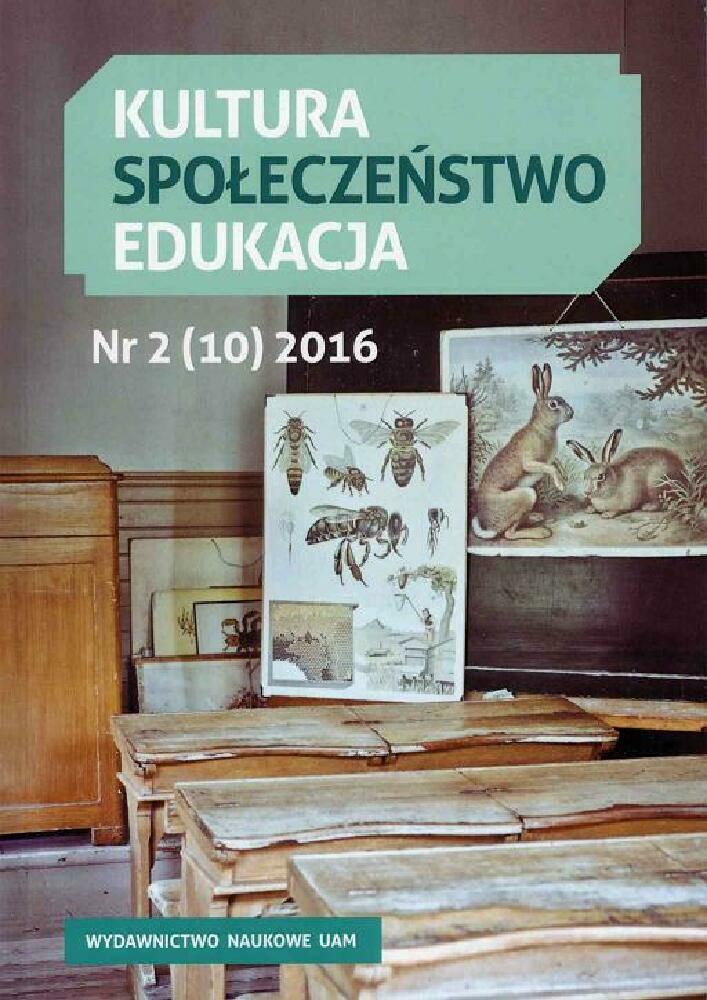Abstrakt
Europeanism exceeds the political and social mindset, it also provides the way of thinking about Europe, the Europeans, their identity, culture and homogeneity, which is paradoxically constituted on the basis of heterogeneity (“unity in diversity”). One may distinguishes two contrary approaches towards the UE: Euroscepticism and Euroenthusiasm The first orientation is very vivid in the British society and it is reflected not only in the words of politicians but also in the mood of the nation, expressed in the Brexit referendum. The latter orientation is common among Poles who enjoy the privilege of joining to the exclusive club. The European and citizenship education reflect these antagonistic approaches. The aim of the paper is an attempt to reconstruct and analyse the contemporary debate on citizenship education in the perspective of European Union. The analyse of educational trends about Europe and Europeanism is significant if Brexit is taking into the consideration.
Bibliografia
Banks J.A. (2008). Diversity and citizenship education in global times. [In:] J. Arthur, I. Davies, C. Hahn (eds.). Education for Citizenship and Democracy. London.
Barber B. (2008). Skonsumowani. Jak rynek psuje dzieci, infantylizuje dorosłych i połyka obywateli. Warszawa.
Beck J. (2012). A brief history of citizenship education in England and Wales. [In:] J. Arthur, H. Cremin (eds.). Debates in Citizenship Education. London and New York.
Blinder S. (2014). UK Public Opinion toward Immigration: Overall Attitudes and Level of Concern, 03/07/2014, www.migrationobservatory.ox.ac.uk, dostęp: 7.05.2015.
Bracey P., Gove-Humphries A., Jackson D. (2011). Teaching diversity in the history classroom. [In:] I. Davies (ed.). Debates in Teaching History. Oxon.
Dale R. (2009). Contexts, constraints and resources in development of European Education Space and European Education Policy. [In:] R. Dale, S. Robertson (eds.). Globalization & Europeanisation in Education. Oxford.
Davies E. (2015). EU is being promoted in skewed history lessons: Academics warn teachers are promoting a ‘soft push’ for further European integration in British classrooms, “Daily Mail”, 26.02.2015, http://www.dailymail.co.uk/news/article-2969665/EU-promoted-skewed-historylessons-Academics-warn-teachers-promoting-soft-push-European-integration-British-classrooms.html#ixzz3dtIqrpuP, dostęp: 8.06.2015.
Davies I. (2012). Perspectives on citizenship education. [In:] J. Arthur, H. Cremin (eds.). Debates in Citizenship Education. London and New York.
Eurobarometr. (2010). Poverty and social exclusion report, 74.1, http://ec.europa.eu/public_opinion/archives/ebs/ebs_355_en.pdf, dostęp: 13.09.2013.
Eurobarometr. (2011). New Europeans report, 73.3, http://ec.europa.eu/public_opinion/archives/ebs/ebs_346_en.pdf, dostęp: 13.09.2013.
Eurobarometr. (2012). European Citizenship report, 77, http://ec.europa.eu/public_opinion/archives/ eb/eb77/eb77_citizen_en.pdf, dostęp: 10.02.2014.
Eurobarometr. (2013). Public opinion in the European Union report, 79, http://ec.europa.eu/public_opinion/archives/eb/eb79/eb79_first_en.pdf, dostęp: 9.02.2014.
Eurobarometr. (2015). Public opinion in the European Union, 83, http://ec.europa.eu/COMMFrontOffice/publicopinion/index.cfm/Survey/getSurveyDetail/instruments/STANDARD/surveyKy/2099, dostęp: 19.09.2016.
Eurobarometr. (2015). Główne wyzwania dla UE, migracja oraz sytuacja gospodarcza i społeczna 84.1, http://www.europarl.europa.eu/pdf/eurobarometre/2015/2015parlemeter/eb84_1_executive_summary_pl.pdf, dostęp: 8.09.2016.
Grzybowski P.P. (2007). Europejska obywatelskość – sfera elit, czy worek bez dna? [W:] J. Nikitorowicz, D. Misiejuk, M. Sobecki (red.). Etniczność i obywatelskość w Nowej Europie. Konteksty edukacji międzykulturowej. Białystok.
Gumkowska M. et. al. (2008). Indeks społeczeństwa obywatelskiego Polsce 2007. Warszawa.
Heater D. (2004). A History of Education for Citizenship. London–New York.
Helm T. (2013). Shock four-country poll reveals widening gulf between Britain and EU, “The Guardian”, 1.12.2013, https://www.theguardian.com/world/2013/nov/30/shock-poll-revealsgulf-britain-eu-france-germany-poland-hostile, dostęp: 12.05.2015.
Hejwosz-Gromkowska D. (2013). Wychowanie obywatelskie: między ekskluzywnością a inkluzyjnością. [W:] W. Żłobicki (red.). Współczesna przestrzeń edukacyjna. Geneza, przemiany, nowe znaczenia, t. 1. Kraków.
Hubner D. (2004). Człowiek w jednoczącej się Europie. „Biblioteka Horyzontów Wychowania”, t. 1. Kraków.
Kerr D. (2012). Comparative and international perspectives on citizenship education. [In:] J. Arthur, H. Cremin (eds.). Debates in Citizenship Education. London and New York.
Kerr D., Smith A., Twine C. (2008). Citizenship education in the United Kingdom. [In:] J. Arthur, I. Davies, C. Hahn (eds.). Education for Citizenship and Democracy. London.
Kotecha S. (2013). Quarter of Young British People ‘Do Not Trust Muslims’, BBC, 25.09.2013, http://www.bbc.co.uk/newsbeat/article/24204742/quarter-of-young-british-people-do-not-trustmuslims, dostęp: 8.06.2015.
Kuczur T. (2008). Ethnos i polities. Naród a społeczeństwo obywatelskie we współczesnej Europie. Toruń.
Magalhaes A.M., Stoer S.R. (2009). Performance, citizenship and the knowledge society: a New mandate for European Education Policy. [In:] R. Dale, S. Robertson (eds.). Globalization & Europeanisation in Education. Oxford.
Mason C. (2012). The civic engagement of young people living in areas of socio-economic disadvantage. [In:] J. Arthur, H. Cremin (eds.). Debates in Citizenship Education. London and New York.
McGhee D. (2008) The End of Multiculturalism. Terrorism, Integration and Human Rights. Berkshire.
Melosik Z. (1998). Wychowanie obywatelskie: nowoczesność, ponowoczesność. (Próba konfrontacji). [W:] Z. Melosik, K. Przyszczypkowski (red.). Wychowanie obywatelskie. Studium teoretyczne, porównawcze i empiryczne. Poznań–Toruń.
Nikitorowicz J. (2007). Prognozy Nowej Europy w kontekście realizowania zadań edukacji międzykulturowej. [W:] J. Nikitorowicz, D. Misiejuk, M. Sobecki (red.). Etniczność i obywatelskość w Nowej Europie. Konteksty edukacji międzykulturowej. Białystok.
Olech A. (2014). Między zainteresowaniem a zaangażowaniem– aktywność obywatelska i organizacje pozarządowe w Polsce, „Analizy i Opinie”, Numer specjalny 7, „Decydujmy razem”.
Osler A. (2009). Patriotism, multiculturalism and belonging: political discourse and the teaching of history. “Educational Review”, Vol. 61, No. 1, February.
Osler A. (2016). Citizenship education, social justice, and BREXIT. https://www.researchgate.net/publication/308917612_Citizenship_education_social_justice_and_BREXIT, dostęp: 15.11.2016.
Pickard J. (2015). Britons split down the middle on EU exit, says poll. “Financial Times” 15.04.2015.
http://www.ft.com/cms/s/0/8112935e-e2ca-11e4-bf4b-00144feab7de.html#axzz3d8eHVEDQ, dostęp 8.06.2015.
Reenen Van J. (2016). BREXIT 2016. Policy analysis from the Centre for Economic Performance, http://cep.lse.ac.uk/pubs/download/brexit08_book.pdf, dostęp 23.08.2016.
Sabour M’Hammed (2009). Globalisation and Europeanisation: unicentricity and polycentricity and the role of intellectuals. [In:] R. Dale, S. Robertson (eds.). Globalization & Europeanisation in Education. Oxford.
Simms B. (2015). Europe: the longest debete. „Teaching History” 163, June.
Smith A.D. (2007). Nacjonalizm. Warszawa.
Starkey H. (2008). Antiracism. [In:] J. Arthur, I. Davies, C. Hahn (eds.). Education for Citizenship and Democracy. London.
Szczurek-Boruta A. (2007). Stałość i zmienność. Poczucie tożsamości narodowej młodzieży i nowy wymiar edukacji. [W:] J. Nikitorowicz, D. Misiejuk, M. Sobecki (red.). Etniczność i obywatelskość w Nowej Europie. Konteksty edukacji międzykulturowej. Białystok 2007.
Waterfield B. (2014). Merkel backs call for EU school lessons to counter ‘growing Euro-scepticism’, “The Telegraph”, 7.04.2014, http://www.telegraph.co.uk/news/worldnews/europe/eu/10683766/Merkel-backs-call-for-EU-school-lessons-to-counter-growing-Euro-scepticism.html, dostęp: 7.06.2015.
Netografia
http://www.theguardian.com/uk-news/2014/jun/17/immigration-british-attitudes-harden-benefits
http://lordashcroftpolls.com/2016/06/how-the-united-kingdom-voted-and-why/
Licencja
Prawa autorskie (c) 2017 Daria Hejwosz-Gromkowska

Utwór dostępny jest na licencji Creative Commons Uznanie autorstwa – Bez utworów zależnych 4.0 Międzynarodowe.
